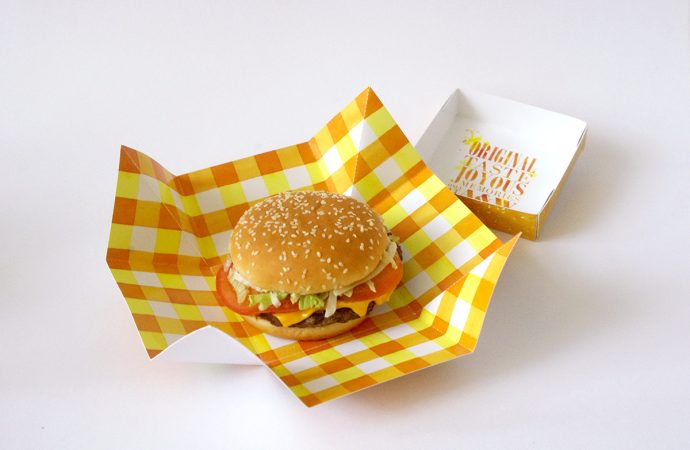Custom burger paper is becoming very trendy in the modern, environmentally friendly environment, which begs the question about its environmental impact. Although the advantages of such packaging are a brand and food safety, the sustainability, recyclability, and waste control issues are still topical. With the growth of fast food, gourmet burger chains, there is also
Custom burger paper is becoming very trendy in the modern, environmentally friendly environment, which begs the question about its environmental impact. Although the advantages of such packaging are a brand and food safety, the sustainability, recyclability, and waste control issues are still topical. With the growth of fast food, gourmet burger chains, there is also an increased need for sharp-looking solutions for wrapping burgers.
But in order to make a sustainable decision regarding this paper, it is important to know its lifecycle, i.e., the production until the disposal of this paper. This article brings out the major ecological issues and gives an idea of making better decisions using burger paper wraps. So, what about minimizing or avoiding at the risk of losing quality or branding? Let us plunge into it.
Too Much Paper Wastage
The thriving food business has given a high rise to disposable wrappings such as burger wrapping paper. Restaurants use busloads of burger paper, cluttered in their daily operations, with the majority being dumped after a time of use. These wastes fill landfills, hence making them overflow. The problem is worsened by the use of non-compostable materials. It will also be possible to waste less by selecting to use compostable or recyclable paper to wrap the burger.
Printing Chemicals Effect
Most custom burger paper with logo employs the usage of inks which are chemical based and might cause damage to the environment. Such inks have the possibility of emitting volatile organic compounds (VOCs) when printing and disposing of them, affecting air and soil quality. The change to soy-based inks or all-water-based inks that are printed on a burger paper will decrease this environmental burden and guarantee safer biodegradation, particularly on kraft paper burger wrap or greaseproof burger paper.
Problems with Recycling
Most of the papers that are used in wrapping a lot of burger wraps, and in particular those that are anchored with greaseproof elements, are not easy to recycle. The fibers get contaminated with oils and food particles, and normal recycling is not applicable in this case. Moreover, the wraps of the burger as laminated plastic-coated burger paper, cannot be recycled using the regular facilities. The answer is the choice of the uncoated or compostable burger wrappings that degrade without complicating the recycling flows.
Biodegradability Concerns
Not every burger paper design is biodegradable. Particular variations have plastic layers or well-known synthetics that exaggerate breakdown. This may cause long-run microplastic pollution and persistence at landfills. Using Kraft paper burger wrappers that contain no plastic additives is a way that a business organization can ensure it runs functional operations and, at the same time, adopt biodegradable objectives through the use of minimalistic burger paper design principles.
Excess Usage of Resources
The production of paper sheets, which are used to make burgers, requires a lot of resources, namely water, energy, and raw materials such as virgin pulp. Such inputs overload the natural ecosystems and raise carbon emissions. The overall impact can be reduced considerably when using recycled materials or when buying custom FSC-certified paper, working on burger paper orders that contribute to the demand of the circular production systems.
The Cons of Greaseproof Alternatives
A frequently used and oil-resistant material is greaseproof burger paper, which, however, frequently includes PFAS (per- and polyfluoroalkyl substances), whichenvironmentallymentallyl persistent and unhealthy. There are currently safer alternatives to protect with coatings or their counterparts now available in a PFAS-free formula, and have the same results without a decrease in performance. Companies also need to check the makeup of the paper used in burger wrapping so that it does not affect their health and is friendly to the environment.
Eco Design Is Important
Other branding strategies, like Burger paper design, should have green objectives. Excessively intensive designs that require several inks or layers can negatively influence recyclability and pose a burden on the environment. The appeal can be added with a clean, minimalistic form and the use of natural dyes and kraft paper backgrounds that would maintain the creation environmentally friendly. Strategic design assists in branding as well as environmental responsibility.
Volume Orders, Volume Effect
Wholesale could be thought of as a good decision when ordering Wax wrapping papers, but in the event of any changes being applied to the branding or the paper becoming outdated then this can mean extreme wastage since the whole lot will have to be thrown out. The bulk orders should be well planned, and environmental implications should be considered. Choose versatile runs or seasonal designs, which will eliminate the possibility of excess inventory going to waste, and store paper in a place where it will not be damaged.
Conclusion
Although it is evident that branded packaging is good, companies should also consider the environmental effects of the type of burger wrapping adopted. Whether in the printing process to the disposal process, each choice made in the biography of burger papers counts.
The environmentally friendly options, such as the production of biodegradable kraft paper, the avoidance of hazardous inks, and the minimalist design of burger paper, allow for the choice of a more sustainable food packaging option.
The Responsible brands know that attractive packaging does not require the environment to lose out. Companies need to focus on sustainability to be the leading force in initiating a change in food presentation and protection practices, where they are more ethical and more successful.
















